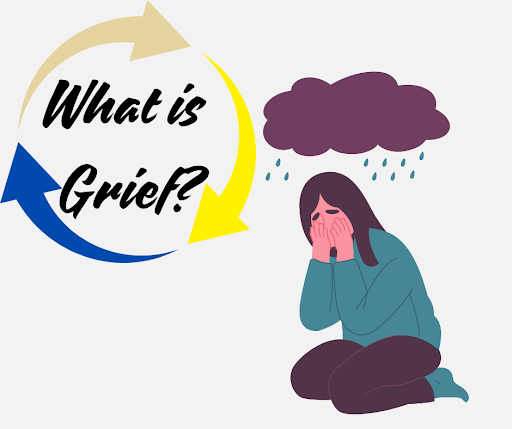Grief is something we often struggle with as widows, so let’s spend some time with the word and think about what it means. As you are reading, please remember that grief is a normal response to loss, and your journey is specific to you. We’re going to dive into grief research and what grief is, according to experts in the field.
The American Psychological Association defines grief as “Grief is the anguish experienced after significant loss, usually the death of a beloved person. Grief often includes physiological distress, separation anxiety, confusion, yearning, obsessive dwelling on the past, and apprehension about the future.”
Depending on the source, grief has many theories and definitions. It is a natural response to a loss in life. In addition to happening when someone important to us dies, grief can occur when a relationship ends, a job is lost, our health declines, or we go through a significant transition in our life that changes how we function. In our blog, we focus on the grief that is associated with the loss of a partner.
You may be familiar with the “stages” of grief by Kubler-Ross, known for defining the stages we go through when grieving a loss. Her research was initially written for those going through a terminal illness and facing their death. This research identified the stages of what is known as anticipatory grief; however, it has come to be accepted by many and is normally referred to when discussing grief. The stages she identified as the grieving process are Denial, Anger, Bargaining, Depression, and Acceptance. Her colleague, David Kessler, has taken these stages one step further into Making Sense. Blog series on stages and our experiences.
There are other grief processing theories, including Stroebe & Schut’s Dual Process Model of grief, that place grief into two orientations:emotion-focused and problem-focused.
Another theory is by Worden, who looks at grief from a task perspective with four tasks:
- Accepting the reality of loss
- Processing the grief pain
- Adjusting to the world without your person
- Finding a connection with your person while moving on in life.
Some of the theorists look at it as a set of emotions, while others look at it as a process.
Regardless, grief is a journey that we must travel when we have a loss in our lives.
Despite the reason for its entrance into our lives, grief transforms our lives. It rarely leaves us without taking us through a journey that causes us to question many things and reidentify who we are without our person. It is a journey that may go in many directions and take us to many places as we search for meaning without our loved ones.
It is important to remember that grief represents a NATURAL response to a loss in our life and is NORMAL. It’s an expression of the love and connection we had. Grief can feel overwhelming and exhausting. It also has the potential to transform us, building our resilience while we find meaning.
As widows and widowers, grief can feel like a burden to carry. It is also a bridge between the life we shared with our loved one and the life we’re building.
There is no right or wrong way to grieve. There’s no timeline or path. Your grief is as unique as the relationship you had with your loved one.
Remember to:
- Give yourself grace & self-compassion: Allow the feelings to come without judgment. It’s okay to feel whatever you feel: exhaustion, sadness, anger, or even moments of peace and joy.
- Take care of YOU: self-care: Take care of yourself the best you can. Nourish your mind, body, and spirit. Take small steps each day to nurture yourself.
- Seek connection : Whether through support groups, trusted friends, family, or spiritual practices, sharing your journey with others can be a powerful source of comfort. It is OK to reach out for assistance if needed.
Grief doesn’t mean the end of hope, joy, or love. As you move forward, take time to reflect on the ways grief is shaping you and see how you’re growing through the grief and loss. You may find that within the pain lies newfound strength and rediscovering life’s possibilities.
You are not alone in this journey.
Peace & blessings to you.
Teresa & Jeni
PS: For additional support, you can download our free copy of 10 Ways to Move Forward After Loss
The First Days: Coping with Life After Loss is a resource for the first days after a loss – available on Amazon in paperback.
My Journey as a Widow: A Widow’s First Journal is a follow-up journal for processing complex emotions and moving forward with hope. It is available in paperback on Amazon.
Follow us on Social Media:
Facebook: https://www.facebook.com/TornInHalfwidows/
LinkedIn: https://www.linkedin.com/company/torn-in-half/
Resources:
Kübler-Ross, E. (1969). On death and dying. Macmillan. https://doi.org/10.4324/9780203010495
Martin, T. L. (2019). Worden, J. W. (2018). Grief Counseling and Grief Therapy. A Handbook for the Mental Health Practitioner. In (Vol. 80, pp. 331-334). Los Angeles, CA: SAGE Publications.
Schut, M. S. H. (1999). THE DUAL PROCESS MODEL OF COPING WITH BEREAVEMENT: RATIONALE AND DESCRIPTION. Death studies, 23(3), 197-224. https://doi.org/10.1080/074811899201046




